Unit 1 What's the matter?Section B 1a—2e课件(共有PPT39张,无音频)
文档属性
| 名称 | Unit 1 What's the matter?Section B 1a—2e课件(共有PPT39张,无音频) | 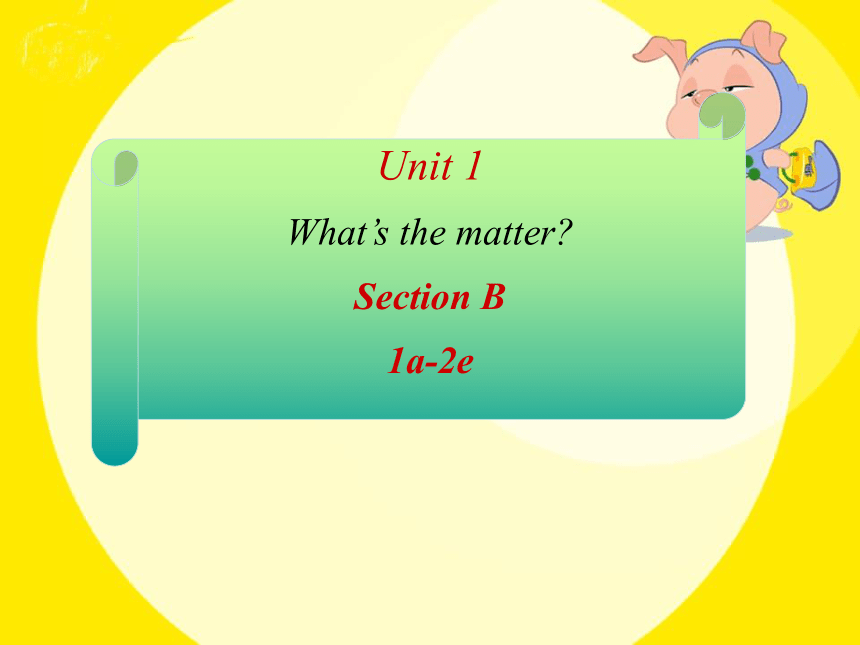 | |
| 格式 | zip | ||
| 文件大小 | 1.3MB | ||
| 资源类型 | 教案 | ||
| 版本资源 | 人教新目标(Go for it)版 | ||
| 科目 | 英语 | ||
| 更新时间 | 2022-02-25 11:22:11 | ||
图片预览

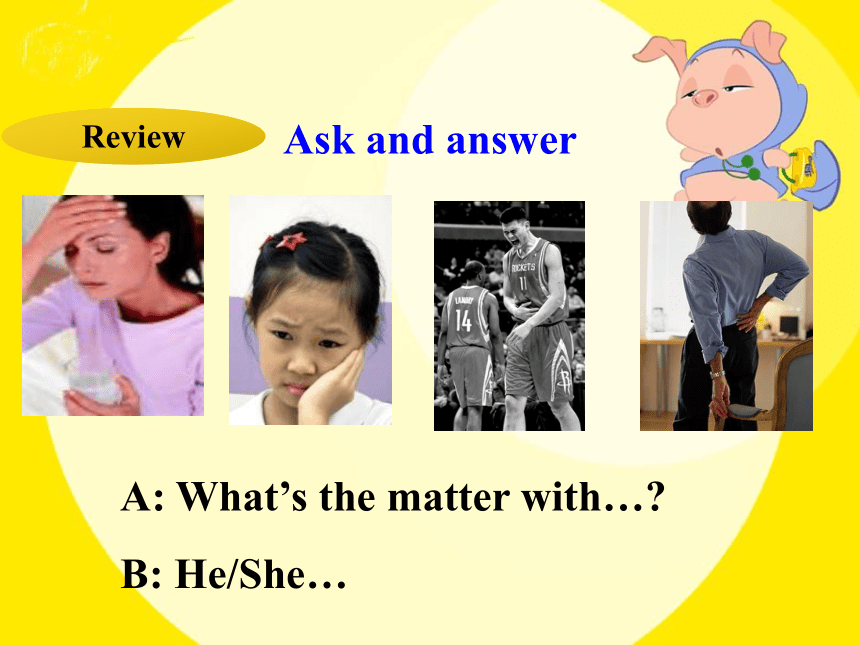
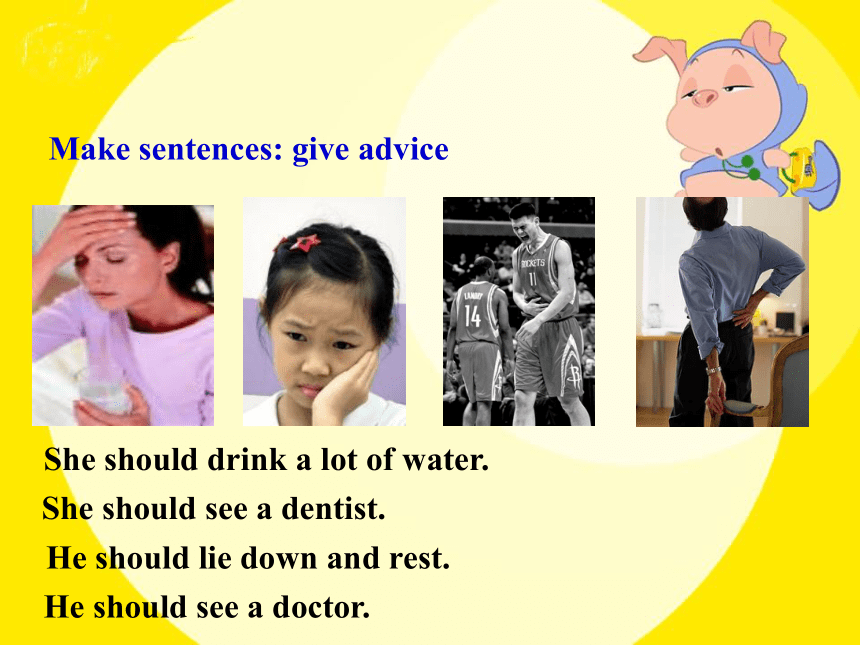

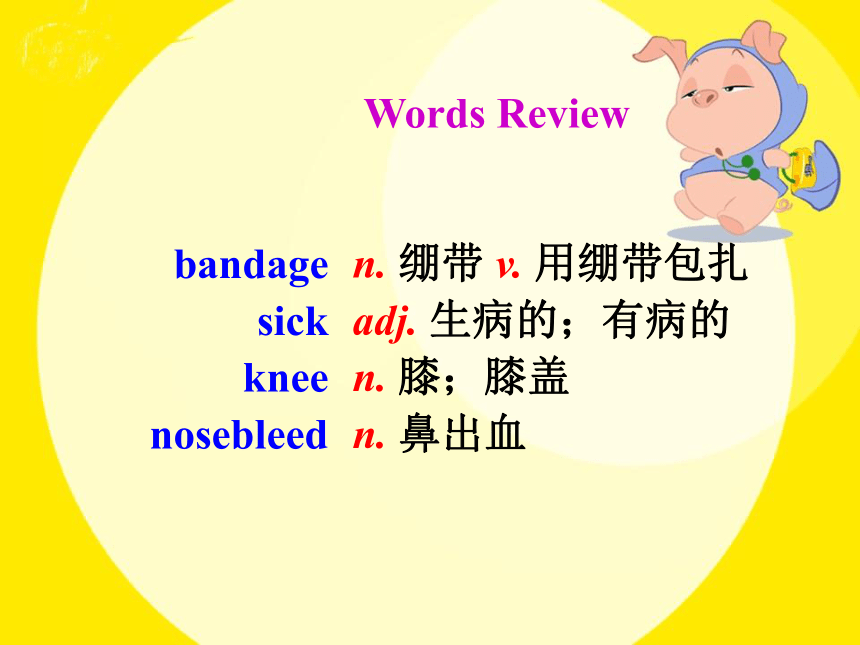
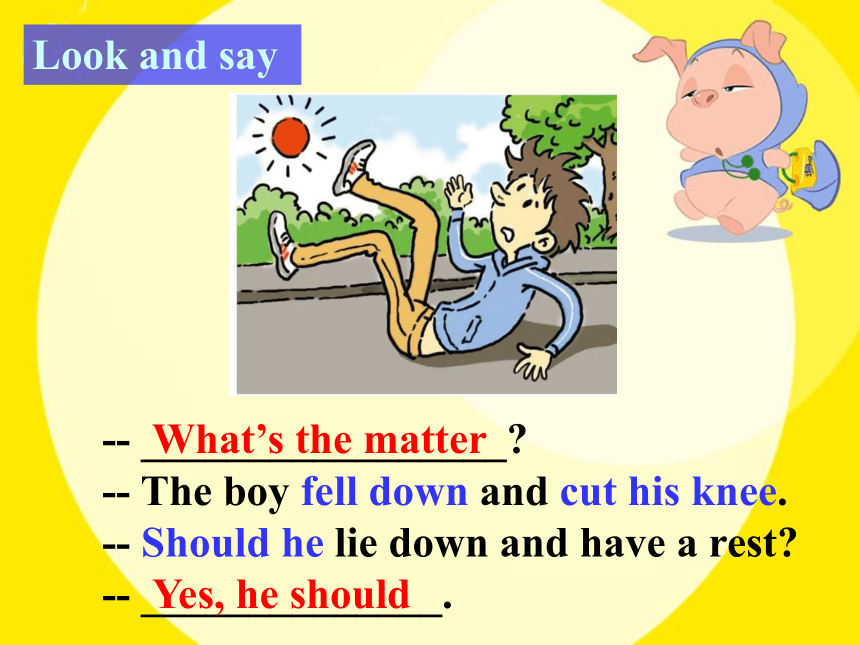
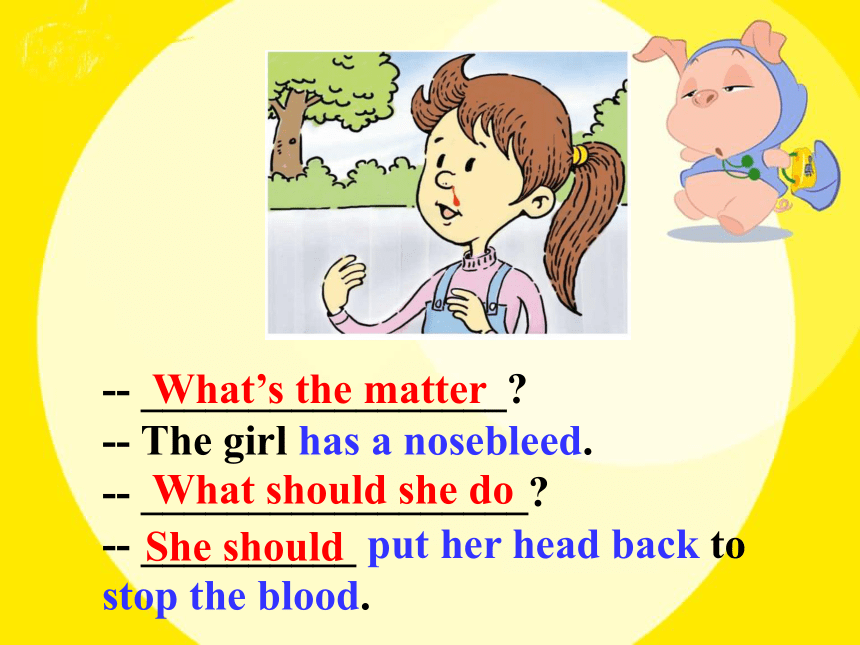
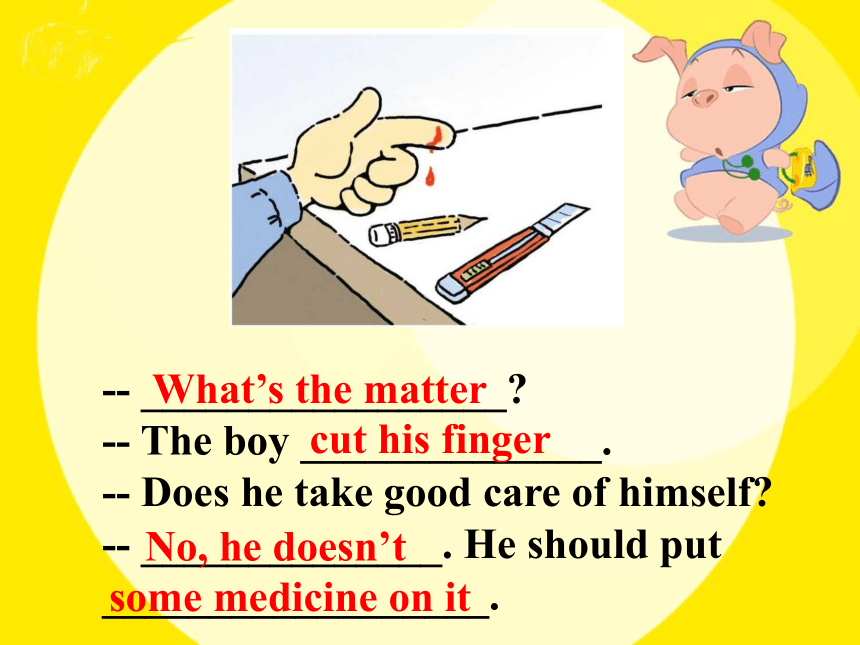
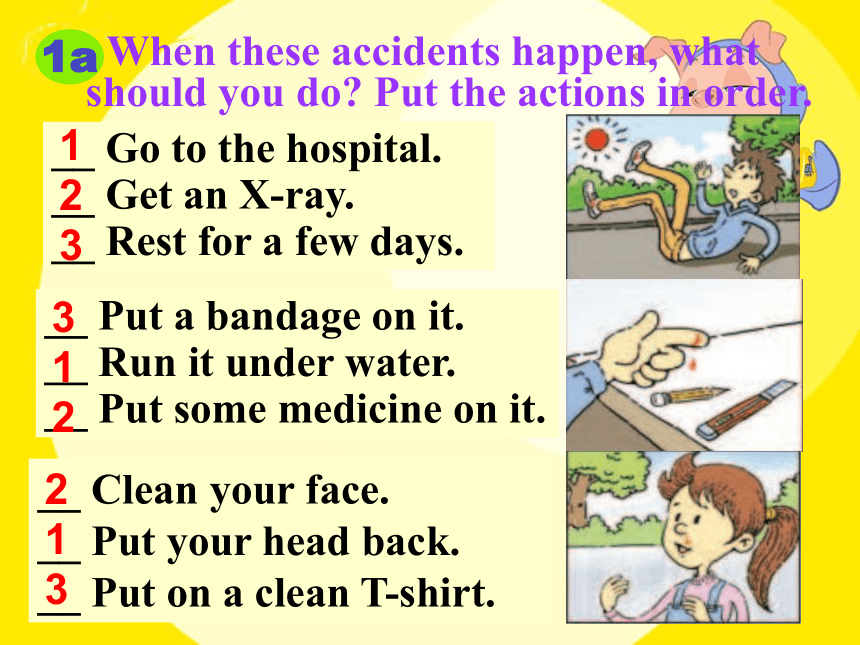
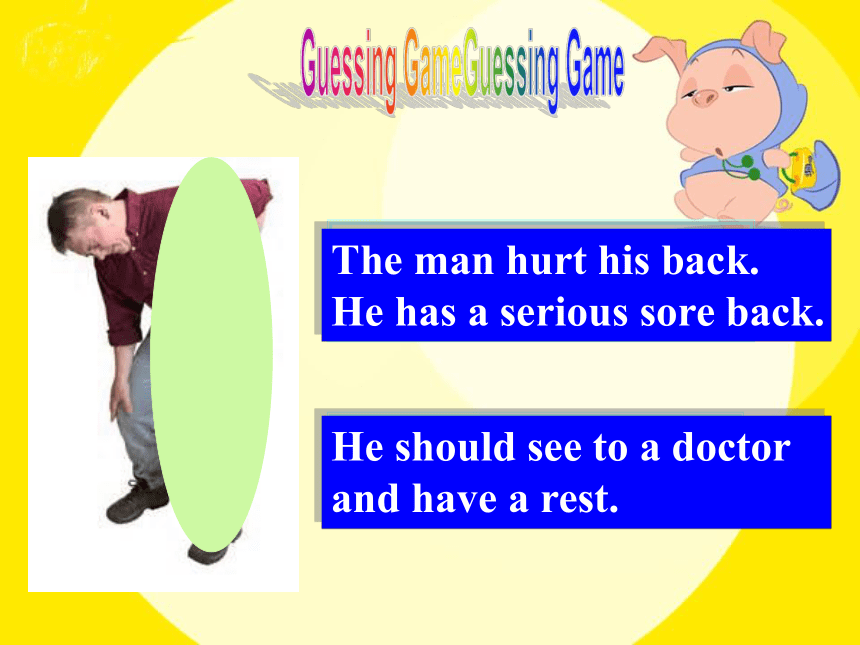
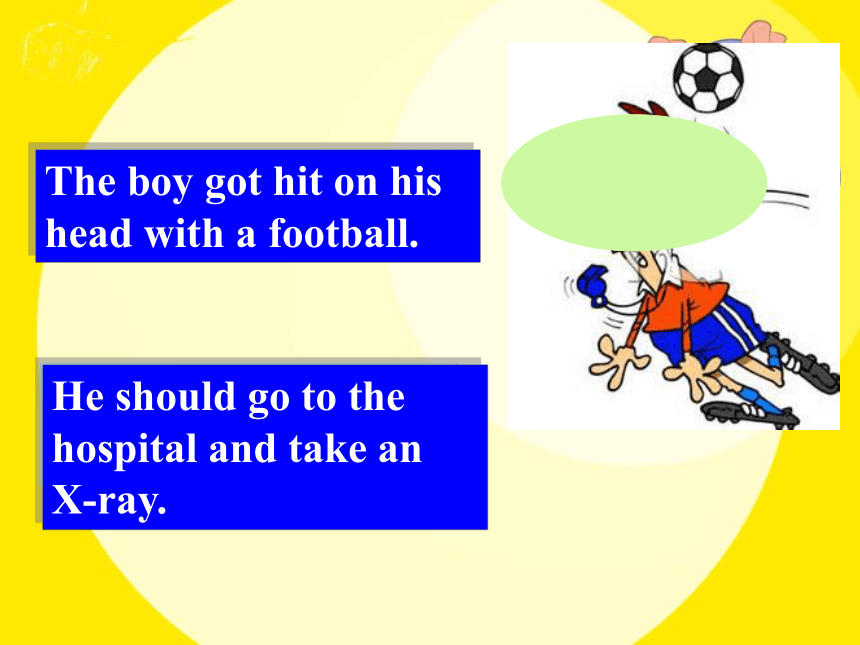
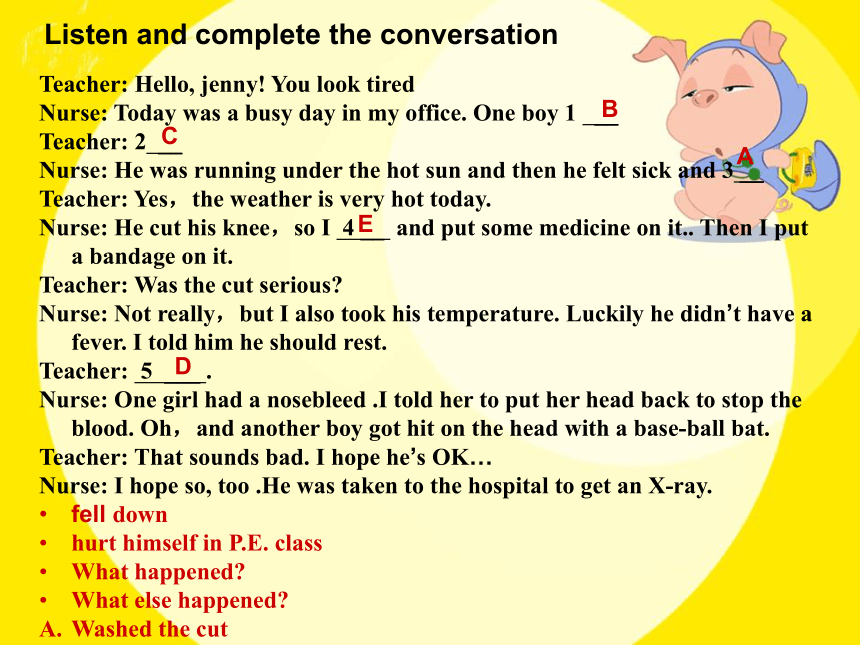
文档简介
(共39张PPT)
Unit 1
What’s the matter
Section B
1a-2e
A: What’s the matter with… B: He/She…
Ask and answer
Review
She should drink a lot of water.
Make sentences: give advice
She should see a dentist.
He should lie down and rest.
He should see a doctor.
What’s the matter
What should the boy do
The boy got hit on his head with a football.
He should go to the hospital and take an X-ray.
Lead in
bandage
sick
knee
nosebleed
n. 绷带 v. 用绷带包扎
adj. 生病的;有病的
n. 膝;膝盖
n. 鼻出血
Words Review
Look and say
-- _________________
-- The boy fell down and cut his knee.
-- Should he lie down and have a rest
-- ______________.
What’s the matter
Yes, he should
-- _________________
-- The girl has a nosebleed.
-- __________________
-- __________ put her head back to stop the blood.
What’s the matter
What should she do
She should
-- _________________
-- The boy ______________.
-- Does he take good care of himself
-- ______________. He should put __________________.
What’s the matter
No, he doesn’t
cut his finger
some medicine on it
1a
When these accidents happen, what should you do Put the actions in order.
__ Go to the hospital.
__ Get an X-ray.
__ Rest for a few days.
__ Put a bandage on it.
__ Run it under water.
__ Put some medicine on it.
__ Clean your face.
__ Put your head back.
__ Put on a clean T-shirt.
1
2
3
3
1
2
2
1
3
Guessing Game
What’s the matter with the man
What should he do
The man hurt his back. He has a serious sore back.
He should see to a doctor and have a rest.
What’s the matter
What should the boy do
The boy got hit on his head with a football.
He should go to the hospital and take an X-ray.
Teacher: Hello, jenny! You look tired
Nurse: Today was a busy day in my office. One boy 1 __
Teacher: 2 __
Nurse: He was running under the hot sun and then he felt sick and 3 __
Teacher: Yes,the weather is very hot today.
Nurse: He cut his knee,so I 4 __ and put some medicine on it.. Then I put a bandage on it.
Teacher: Was the cut serious
Nurse: Not really,but I also took his temperature. Luckily he didn’t have a fever. I told him he should rest.
Teacher: 5 ___ .
Nurse: One girl had a nosebleed .I told her to put her head back to stop the blood. Oh,and another boy got hit on the head with a base-ball bat.
Teacher: That sounds bad. I hope he’s OK…
Nurse: I hope so, too .He was taken to the hospital to get an X-ray.
fell down
hurt himself in P.E. class
What happened
What else happened
Washed the cut
Listen and complete the conversation
B
C
A
E
D
1b
Listen to the school nurse. Check ( ) the problems you hear.
√
Problems Treatments
Someone felt sick.
Someone cut his knee.
Someone had a fever.
Someone had a nosebleed.
Someone hurt his back.
Someone got hit on the head.
√
√
√
√
√
1c
Listen again. Write the letter of each treatment next to the problems you check in the chart above.
Problems Treatments
Someone felt sick.
Someone cut his knee.
Someone had a fever.
Someone had a nosebleed.
Someone hurt his back.
Someone got hit on the head.
b, c
√
√
√
√
d, a, b, c
f
e
1d
Role-play a conversation between the nurse and the teacher. Use the information in 1b and 1c.
A: Who came to your office today
B: First, a boy came in. He hurt
himself in P.E. class.
A: What happened
B: …
Pairwork
1. What would you do in these situations
2. What could we do to prevent these accidents
Call for a doctor or an ambulance (救护车).
Never pull the person out of the car.
Find enough people to lift the car safely and take her to hospital at once.
Look at both sides when crossing the street. Follow the traffic rules and be attentive and careful.
What should you do
Call 119 first and tell them the exact address on the phone.
If someone is badly burnt, we should call 120 to ask for an ambulance.
Never play with fire.
Be careful with gas.
Make sure that all the electric wires are safe.
What should you do
If the cut is not serious, we can wash the area of cut, dry it and cover it with a piece of dry and clean cloth.
You must never play with a knife or other sharp objects in the future.
×
What should you do
碰到意外事故时,应该如何给别人建议。因为意外事故通常比普通的病痛较难处理,因此在给对方建议时应该有步骤地说明该做的事情。
A:发生什么事了?
What happened
B: 我腿受伤了。我该怎么办?
I hurt my leg. What should I do
A: 首先,你应该去医院。 其次,你应该照X片。
First, you should go to the hospital.
Second/Then, you should get an X-ray.
最后,你应该好好休息几天。
Finally, you should rest for a few days.
注:可通过使用first (首先)和 second(其次/第二)等序数词来表达动作先后顺序。也可以用then (然后)来说明中间的步骤。最后的动词可以用finally (最后)来表示。
Accidents or problems can sometimes happen when we do sports. Write the letter of each sport next to each accident or problem that can happen.
A = soccer B = mountain climbing
C = swimming
__ fall down __ have problems breathing
__ get hit by a ball __ get sunburned
__ cut ourselves __ hurt our back or arm
2a
Presentation
Finding the Order of Events
Writers describe events in a certain order. Finding the order of the events will help you understand what you are reading.
Read the statements and circle True,
False or Don’t Know.
1 Aron almost lost his life
three times because of
climbing accidents. True False Don’t know
2 Aron had a serious
accident in April 2003. True False Don’t know
3 Aron ran out of water
after three days. True False Don’t know
4 Aron wrote his book
before his serious accident. True False Don’t know
5 Aron still goes mountain
climbing. True False Don’t know
2c
Read the passage again and answer the questions.
1. Where did the accident happen on
April 26, 2003
2. Why couldn’t Aron move
3. How did Aron free himself
4. What did Aron do after the accident
5. What does “between a rock and
a hard place” mean
2d
1. Where did the accident happen on
April 26, 2003
2. Why couldn’t Aron move
3. How did Aron free himself
It happened in Utah, America.
His arm was caught under a 360-kilo rock that fell on him when he was climbing by himself in the mountains.
He used his knife to cut off half his
right arm.
4. What did Aron do after the accident
5. What does “between a rock and a
hard place” mean
He wrote a book called Between a
Rock and a Hard Place.
It means being in a difficult situation
that you cannot seem to get out of.
Put the sentences in the correct order. Then use them to tell Aron’s story to your partner. Try to add other details from the reading.
1. On April 26, 2003, he had a serious mountain climbing accident.
2. Aron loves mountain climbing and doesn’t mind taking risks.
2e
3. Aron did not give up after the accident and keeps on climbing mountains today.
4. He wrote a book about his experience.
5. Aron lost half his right arm from the 2003 accident.
The correct order: 2, 1, 5, 4, 3
Language points
1.sick adj. 生病的;有病的
He visits his sick uncle in hospital every day.
他每天去医院看望生病的叔叔。
She looked after him when he was sick.
当他生病时, 她照料他。
He fell sick with flu.
他得了流感。
fall sick 生病
get sick 不舒服
feel sick 感到不舒服
look sick 脸色不好
sick用于比喻可指“讨厌的;渴望的;心烦意乱的,恼火的”等。
sick at表示“对某事感到懊丧或不高兴”, 相当于sick about 。
He was very sick at failing in the exam.
sick for表示“渴望, 盼望”, 相当于eager for。
He was sick for a sight of his mother.
sick of表示“对某人或某人做某事感到厌恶或不耐烦”, 相当于tired of。
I'm sick of the rain!
2. … he wrote a book called Between a
Rock and a Hard Place.
Between a Rock and a Hard Place. 此句为习语。表在艰难或危险的处境下“从两难中进行选择”。
e.g. Who will you save when your
mother and wife are both in water
It’s between a rock and a hard place.
3. This means being in a difficult situation that you cannot seem to get out of.
mean v. “……意思是” 或 “意味着”。
e.g. What do you mean
你的意思是什么?
… before we have to make a decision
that could mean life or death.
……在我们做出可能意味着生死的决
定前。
mean to do sth.打算做某事。
e.g. I mean to talk with him about it.
3. be used to doing习惯于做…
used to do过去常常做…
use sth. to do用…来做…
1). As a mountain climber, Aron is used to taking risks.
What do you mean by… /what do you mean
/what's the meaning of … ...是什么意思?
e.g. what do you mean by this word /what’s the meaning of the word
2). We used to study English and get good grades.
3). The students often use the computer to play games.
运用:
1.These boys (watch) TV every day.
2. People paper (write) these days.
3. Most people (eat )meals in right hand.
4. Interest : n./v. 兴趣/使…感兴趣 固定用法:
are used to watching
use
to write
used to eat
e.g.
1). Tom in history books in the past.
2).The book is .
3). Mr. Wang is an teacher.
a. sb. be interested in sth./take an interest in sth. 对…感兴趣 b. interested 与人有关,interesting 与物有关.
5. With 和in 作“用”意思时,with常指用…工具(fork/knife 等),而in指用语言、声音、材料等。
1).we write homework pen.
2).Chinese talk with each other Chinese.
was interested
interesting
interested
with
in
1. You should take care not to h yourself in P.E. class.
2. Oh, you got h on the head! Was it serious
3. Tom cut his (膝盖) yesterday. He should have a rest.
4. The most beautiful mother didn’t think about (她自己) when she saved the child.
5. Wash the cut and put a (绷带)on it .
I. 根据首字母或汉语提示完成单词。
urt
it
knee
herself
bandage
practice
1. ——你怎么了,戴伟?
——我嗓子疼。
______ the ________ ________ you, David
I have .
2. ——辛迪发烧了。
——她应该看医生。
Cindy .
She should .
3. ——刚才我摔倒受伤了。
——你应去医院照X光检查
——I and hurt myself just now.
——You should go to the hospital and .
4. ——你应该多喝水。
You drink hot water.
Ⅱ、根据汉语意思完成英语句子,每空一词
What’s
matter
with
a sore throat
has a fever.
go to the hospital
fell down
take an X—ray
should
some
III.Choose the best answer.
1. Mr. More has more money than Mr.
Little. But he doesn’t enjoy ___.
A. he B. him C. his D. himself
2. Lily was 9 years old. ___ was old enough
to go to school ___.
A. She, she B. She, herself
C. Her, herself D. Her, She
B
D
3. I made the cake by ___. Help ___, Tom.
A. ourselves, yourself
B. myself, yourself
C. myself, you D. me, him
4. Who taught ___ history last year
Nobody! He learned it ___.
A. him, himself B. his, himself
C. himself, himself D. his, him
B
A
5. The camera is ____ expensive ____ I
can't afford it.
A. so, that B. such, that
C. so, as to D. enough, that
6. Miss Gao asked a question, but it was ____ that nobody could answer it.
A. very difficult B. too difficult
C. difficult enough D. so difficult
A
D
Unit 1
What’s the matter
Section B
1a-2e
A: What’s the matter with… B: He/She…
Ask and answer
Review
She should drink a lot of water.
Make sentences: give advice
She should see a dentist.
He should lie down and rest.
He should see a doctor.
What’s the matter
What should the boy do
The boy got hit on his head with a football.
He should go to the hospital and take an X-ray.
Lead in
bandage
sick
knee
nosebleed
n. 绷带 v. 用绷带包扎
adj. 生病的;有病的
n. 膝;膝盖
n. 鼻出血
Words Review
Look and say
-- _________________
-- The boy fell down and cut his knee.
-- Should he lie down and have a rest
-- ______________.
What’s the matter
Yes, he should
-- _________________
-- The girl has a nosebleed.
-- __________________
-- __________ put her head back to stop the blood.
What’s the matter
What should she do
She should
-- _________________
-- The boy ______________.
-- Does he take good care of himself
-- ______________. He should put __________________.
What’s the matter
No, he doesn’t
cut his finger
some medicine on it
1a
When these accidents happen, what should you do Put the actions in order.
__ Go to the hospital.
__ Get an X-ray.
__ Rest for a few days.
__ Put a bandage on it.
__ Run it under water.
__ Put some medicine on it.
__ Clean your face.
__ Put your head back.
__ Put on a clean T-shirt.
1
2
3
3
1
2
2
1
3
Guessing Game
What’s the matter with the man
What should he do
The man hurt his back. He has a serious sore back.
He should see to a doctor and have a rest.
What’s the matter
What should the boy do
The boy got hit on his head with a football.
He should go to the hospital and take an X-ray.
Teacher: Hello, jenny! You look tired
Nurse: Today was a busy day in my office. One boy 1 __
Teacher: 2 __
Nurse: He was running under the hot sun and then he felt sick and 3 __
Teacher: Yes,the weather is very hot today.
Nurse: He cut his knee,so I 4 __ and put some medicine on it.. Then I put a bandage on it.
Teacher: Was the cut serious
Nurse: Not really,but I also took his temperature. Luckily he didn’t have a fever. I told him he should rest.
Teacher: 5 ___ .
Nurse: One girl had a nosebleed .I told her to put her head back to stop the blood. Oh,and another boy got hit on the head with a base-ball bat.
Teacher: That sounds bad. I hope he’s OK…
Nurse: I hope so, too .He was taken to the hospital to get an X-ray.
fell down
hurt himself in P.E. class
What happened
What else happened
Washed the cut
Listen and complete the conversation
B
C
A
E
D
1b
Listen to the school nurse. Check ( ) the problems you hear.
√
Problems Treatments
Someone felt sick.
Someone cut his knee.
Someone had a fever.
Someone had a nosebleed.
Someone hurt his back.
Someone got hit on the head.
√
√
√
√
√
1c
Listen again. Write the letter of each treatment next to the problems you check in the chart above.
Problems Treatments
Someone felt sick.
Someone cut his knee.
Someone had a fever.
Someone had a nosebleed.
Someone hurt his back.
Someone got hit on the head.
b, c
√
√
√
√
d, a, b, c
f
e
1d
Role-play a conversation between the nurse and the teacher. Use the information in 1b and 1c.
A: Who came to your office today
B: First, a boy came in. He hurt
himself in P.E. class.
A: What happened
B: …
Pairwork
1. What would you do in these situations
2. What could we do to prevent these accidents
Call for a doctor or an ambulance (救护车).
Never pull the person out of the car.
Find enough people to lift the car safely and take her to hospital at once.
Look at both sides when crossing the street. Follow the traffic rules and be attentive and careful.
What should you do
Call 119 first and tell them the exact address on the phone.
If someone is badly burnt, we should call 120 to ask for an ambulance.
Never play with fire.
Be careful with gas.
Make sure that all the electric wires are safe.
What should you do
If the cut is not serious, we can wash the area of cut, dry it and cover it with a piece of dry and clean cloth.
You must never play with a knife or other sharp objects in the future.
×
What should you do
碰到意外事故时,应该如何给别人建议。因为意外事故通常比普通的病痛较难处理,因此在给对方建议时应该有步骤地说明该做的事情。
A:发生什么事了?
What happened
B: 我腿受伤了。我该怎么办?
I hurt my leg. What should I do
A: 首先,你应该去医院。 其次,你应该照X片。
First, you should go to the hospital.
Second/Then, you should get an X-ray.
最后,你应该好好休息几天。
Finally, you should rest for a few days.
注:可通过使用first (首先)和 second(其次/第二)等序数词来表达动作先后顺序。也可以用then (然后)来说明中间的步骤。最后的动词可以用finally (最后)来表示。
Accidents or problems can sometimes happen when we do sports. Write the letter of each sport next to each accident or problem that can happen.
A = soccer B = mountain climbing
C = swimming
__ fall down __ have problems breathing
__ get hit by a ball __ get sunburned
__ cut ourselves __ hurt our back or arm
2a
Presentation
Finding the Order of Events
Writers describe events in a certain order. Finding the order of the events will help you understand what you are reading.
Read the statements and circle True,
False or Don’t Know.
1 Aron almost lost his life
three times because of
climbing accidents. True False Don’t know
2 Aron had a serious
accident in April 2003. True False Don’t know
3 Aron ran out of water
after three days. True False Don’t know
4 Aron wrote his book
before his serious accident. True False Don’t know
5 Aron still goes mountain
climbing. True False Don’t know
2c
Read the passage again and answer the questions.
1. Where did the accident happen on
April 26, 2003
2. Why couldn’t Aron move
3. How did Aron free himself
4. What did Aron do after the accident
5. What does “between a rock and
a hard place” mean
2d
1. Where did the accident happen on
April 26, 2003
2. Why couldn’t Aron move
3. How did Aron free himself
It happened in Utah, America.
His arm was caught under a 360-kilo rock that fell on him when he was climbing by himself in the mountains.
He used his knife to cut off half his
right arm.
4. What did Aron do after the accident
5. What does “between a rock and a
hard place” mean
He wrote a book called Between a
Rock and a Hard Place.
It means being in a difficult situation
that you cannot seem to get out of.
Put the sentences in the correct order. Then use them to tell Aron’s story to your partner. Try to add other details from the reading.
1. On April 26, 2003, he had a serious mountain climbing accident.
2. Aron loves mountain climbing and doesn’t mind taking risks.
2e
3. Aron did not give up after the accident and keeps on climbing mountains today.
4. He wrote a book about his experience.
5. Aron lost half his right arm from the 2003 accident.
The correct order: 2, 1, 5, 4, 3
Language points
1.sick adj. 生病的;有病的
He visits his sick uncle in hospital every day.
他每天去医院看望生病的叔叔。
She looked after him when he was sick.
当他生病时, 她照料他。
He fell sick with flu.
他得了流感。
fall sick 生病
get sick 不舒服
feel sick 感到不舒服
look sick 脸色不好
sick用于比喻可指“讨厌的;渴望的;心烦意乱的,恼火的”等。
sick at表示“对某事感到懊丧或不高兴”, 相当于sick about 。
He was very sick at failing in the exam.
sick for表示“渴望, 盼望”, 相当于eager for。
He was sick for a sight of his mother.
sick of表示“对某人或某人做某事感到厌恶或不耐烦”, 相当于tired of。
I'm sick of the rain!
2. … he wrote a book called Between a
Rock and a Hard Place.
Between a Rock and a Hard Place. 此句为习语。表在艰难或危险的处境下“从两难中进行选择”。
e.g. Who will you save when your
mother and wife are both in water
It’s between a rock and a hard place.
3. This means being in a difficult situation that you cannot seem to get out of.
mean v. “……意思是” 或 “意味着”。
e.g. What do you mean
你的意思是什么?
… before we have to make a decision
that could mean life or death.
……在我们做出可能意味着生死的决
定前。
mean to do sth.打算做某事。
e.g. I mean to talk with him about it.
3. be used to doing习惯于做…
used to do过去常常做…
use sth. to do用…来做…
1). As a mountain climber, Aron is used to taking risks.
What do you mean by… /what do you mean
/what's the meaning of … ...是什么意思?
e.g. what do you mean by this word /what’s the meaning of the word
2). We used to study English and get good grades.
3). The students often use the computer to play games.
运用:
1.These boys (watch) TV every day.
2. People paper (write) these days.
3. Most people (eat )meals in right hand.
4. Interest : n./v. 兴趣/使…感兴趣 固定用法:
are used to watching
use
to write
used to eat
e.g.
1). Tom in history books in the past.
2).The book is .
3). Mr. Wang is an teacher.
a. sb. be interested in sth./take an interest in sth. 对…感兴趣 b. interested 与人有关,interesting 与物有关.
5. With 和in 作“用”意思时,with常指用…工具(fork/knife 等),而in指用语言、声音、材料等。
1).we write homework pen.
2).Chinese talk with each other Chinese.
was interested
interesting
interested
with
in
1. You should take care not to h yourself in P.E. class.
2. Oh, you got h on the head! Was it serious
3. Tom cut his (膝盖) yesterday. He should have a rest.
4. The most beautiful mother didn’t think about (她自己) when she saved the child.
5. Wash the cut and put a (绷带)on it .
I. 根据首字母或汉语提示完成单词。
urt
it
knee
herself
bandage
practice
1. ——你怎么了,戴伟?
——我嗓子疼。
______ the ________ ________ you, David
I have .
2. ——辛迪发烧了。
——她应该看医生。
Cindy .
She should .
3. ——刚才我摔倒受伤了。
——你应去医院照X光检查
——I and hurt myself just now.
——You should go to the hospital and .
4. ——你应该多喝水。
You drink hot water.
Ⅱ、根据汉语意思完成英语句子,每空一词
What’s
matter
with
a sore throat
has a fever.
go to the hospital
fell down
take an X—ray
should
some
III.Choose the best answer.
1. Mr. More has more money than Mr.
Little. But he doesn’t enjoy ___.
A. he B. him C. his D. himself
2. Lily was 9 years old. ___ was old enough
to go to school ___.
A. She, she B. She, herself
C. Her, herself D. Her, She
B
D
3. I made the cake by ___. Help ___, Tom.
A. ourselves, yourself
B. myself, yourself
C. myself, you D. me, him
4. Who taught ___ history last year
Nobody! He learned it ___.
A. him, himself B. his, himself
C. himself, himself D. his, him
B
A
5. The camera is ____ expensive ____ I
can't afford it.
A. so, that B. such, that
C. so, as to D. enough, that
6. Miss Gao asked a question, but it was ____ that nobody could answer it.
A. very difficult B. too difficult
C. difficult enough D. so difficult
A
D
同课章节目录
- Unit 1 What's the matter?
- Section A
- Section B
- Unit 2 I'll help to clean up the city parks.
- Section A
- Section B
- Unit 3 Could you please clean your room?
- Section A
- Section B
- Unit 4 Why don't you talk to your parents?
- Section A
- Section B
- Unit 5 What were you doing when the rainstorm came
- Section A
- Section B
- Review of Units 1-5
- Unit 6 An old man tried to move the mountains.
- Section A
- Section B
- Unit 7 What's the highest mountain in the world?
- Section A
- Section B
- Unit 8 Have you read Treasure Island yet?
- Section A
- Section B
- Unit 9 Have you ever been to a museum?
- Section A
- Section B
- Unit 10 I've had this bike for three years.
- Section A
- Section B
